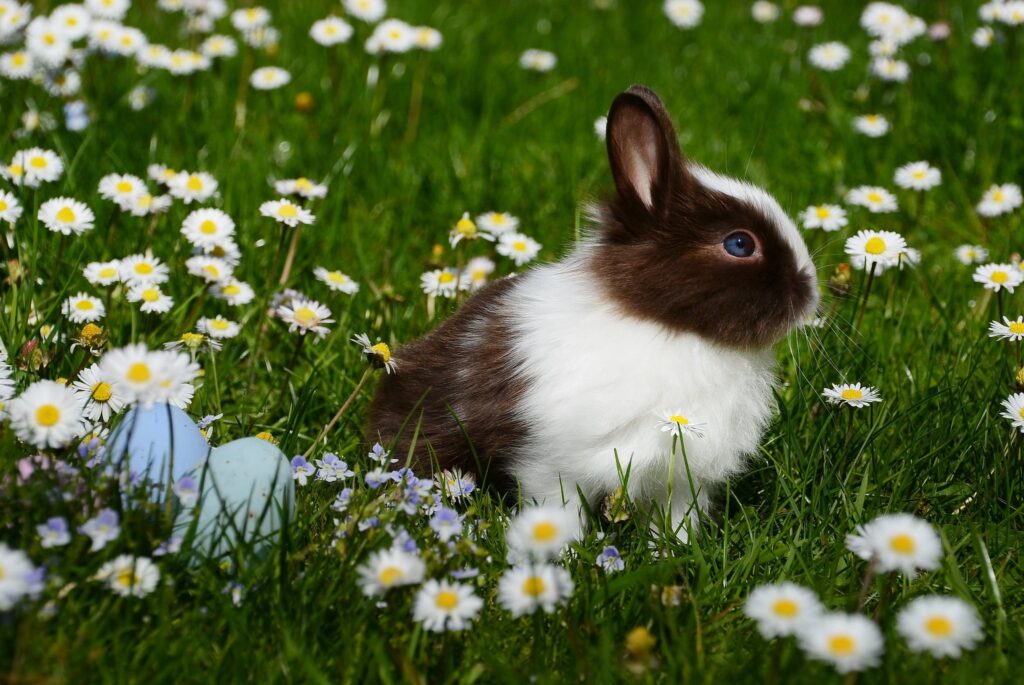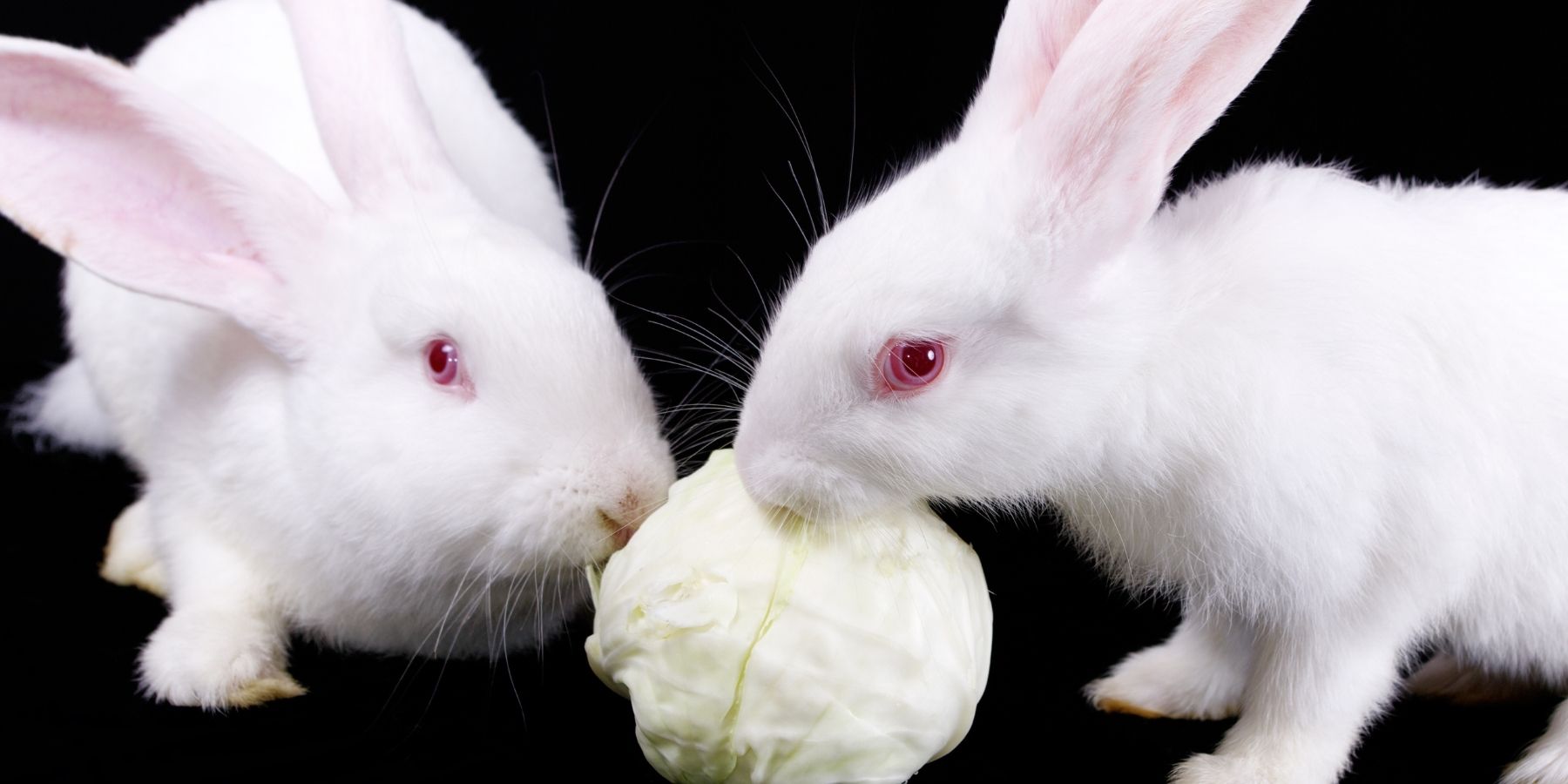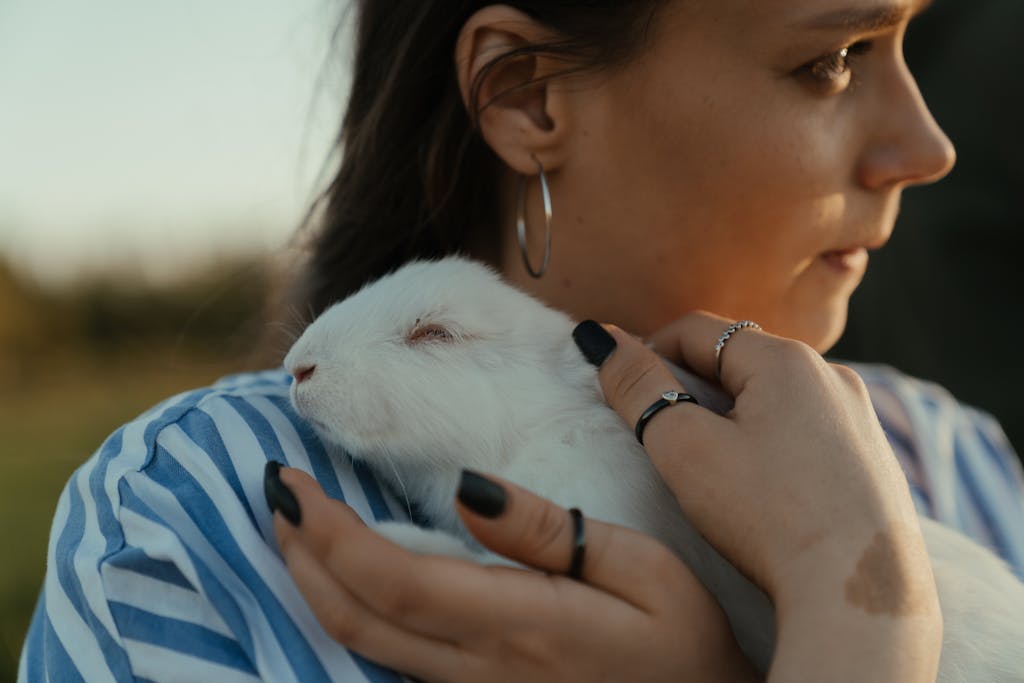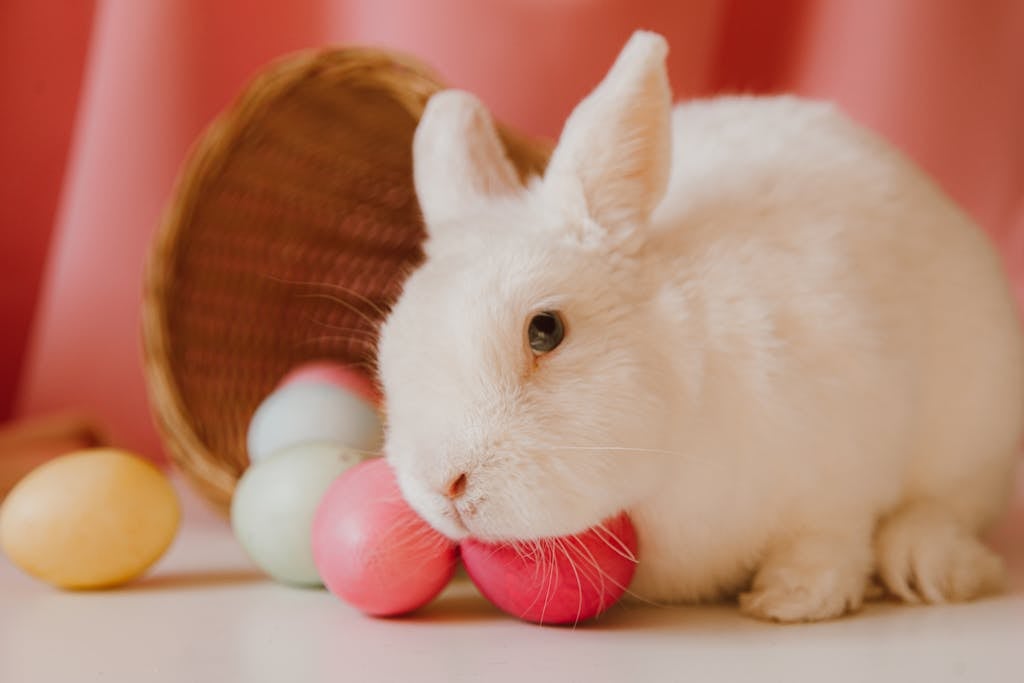Do Rabbits Like Water?
There are some affiliate links below, but they are all products I highly recommend. For more info, view my disclosure here.
Have you ever wondered if rabbits like water? It’s a common misconception that rabbits are afraid of water or that they can’t swim. But the truth is, rabbits are actually quite comfortable around water and can even enjoy it under the right circumstances.

Understanding Rabbit’s Hydration Needs As with any animal, hydration is essential for a rabbit’s health and well-being. While rabbits can get some of their water intake from the food they eat, they still require access to fresh, clean water at all times. Without enough water, rabbits can become dehydrated, which can lead to a range of health problems.
Water Sources for Rabbits So, what are the best water sources for rabbits? Most pet rabbits will drink from a water bottle or bowl, but you need to ensure that the water is changed daily and that the container is kept clean. Some rabbits may also enjoy drinking from a water fountain or a dish of water with ice cubes in it. And while rabbits can get some moisture from fruits and vegetables, these should not be relied upon as a sole source of hydration.
Key Takeaways
- Rabbits are comfortable around water and can even enjoy it under the right circumstances.
- Hydration is essential for a rabbit’s health and well-being, and they require access to fresh, clean water at all times.
- The best water sources for rabbits are water bottles or bowls that are changed daily and kept clean.
Understanding Rabbit’s Hydration Needs

As a responsible rabbit owner, you should take time to understand your pet’s hydration needs. Rabbits require a constant supply of fresh water to maintain their health and well-being. The average rabbit should consume at least 50-150ml of water per kilogram of body weight per day.
For a 5-pound rabbit, this translates to approximately 236-709ml of water per day. However, note that individual needs may vary based on factors such as age, activity level, and diet.
Ensure that your rabbit always has access to clean, fresh water. This can be provided through a water bottle or bowl. Regularly check and clean your rabbit’s water container to prevent the growth of harmful bacteria.
If your rabbit appears particularly thirsty or is not drinking enough water, it may be a sign of an underlying health issue. In such cases, it is best to consult with a veterinarian.
In addition to fresh water, rabbits can also benefit from a little extra hydration through foods such as leafy greens and vegetables. These foods contain a high amount of fluids and can help keep your rabbit hydrated.
By understanding your rabbit’s hydration needs and providing them with adequate water and hydration, you can help ensure their health and happiness.
Water Sources for Rabbits

As a responsible rabbit owner, providing your pet with access to clean and fresh water is crucial for their health and wellbeing. There are several water sources available for rabbits, including water bowls, water bottles, and other types of water feeders.
Water Bowls
Water bowls are a popular choice for many rabbit owners. They are easy to clean and refill, and rabbits can easily access the water. However, water bowls can be easily tipped over or contaminated with food or bedding, which can make the water dirty and unappetizing for your rabbit. To prevent this, clean the water bowl regularly and keep it away from areas where your rabbit may accidentally knock it over.
Water Bottles
Water bottles are another popular choice for providing water to rabbits. They are easy to attach to the side of a cage or hutch, and they prevent water from becoming contaminated with food or bedding. However, some rabbits may have difficulty accessing the water from a bottle, especially if they are not used to it. Check the bottle regularly to ensure that it is working properly and that your rabbit is getting enough water.
Fresh and Clean Water
Regardless of the type of water source you choose, provide your rabbit with fresh and clean water every day. This means changing the water at least once a day and cleaning the water dish or bottle regularly to prevent the buildup of bacteria and other harmful substances.
Other Considerations
When choosing a water source for your rabbit, consider the size and shape of the dish or bottle, as well as the material it is made from. Ceramic bowls are a popular choice because they are heavy and difficult to tip over, while plastic dishes can be easily chewed and damaged.
Consider the type of water you are using. Tap water is generally safe for rabbits, but bottled water may be a better choice if your tap water contains high levels of minerals or other contaminants.
Overall, providing your rabbit with access to clean and fresh water is essential for their health and wellbeing. By choosing the right water source and taking the necessary precautions to keep the water clean, you can help ensure that your rabbit stays healthy and happy.
Rabbits and Water Immersion

Rabbits are not known for being fond of water. In fact, most rabbits will avoid water at all costs, and their survival instincts tell them to stay away from large bodies of water. However, some rabbits, such as swamp rabbits, are known to live in wetland areas and have adapted to living in and around water.
If a rabbit’s coat gets wet, it can be a problem. Wet fur can make a rabbit more susceptible to hypothermia and other health issues. Therefore, keep rabbits dry and warm, especially during colder months.
While rabbits may not be natural swimmers, they are capable of swimming if necessary. However, it is not recommended to put a rabbit in water, such as a swimming pool or garden pond, as they may panic and drown. It is best to keep rabbits away from deep water and provide them with shallow water sources, such as a water bowl.
While some rabbits may be able to swim, it is not a natural or common behavior for them, and could be dangerous. Keep rabbits dry and away from deep water to ensure their health and safety.

Health Implications of Water and Rabbits
As a responsible rabbit owner, ensure that your bunny has access to clean and fresh water at all times. Water is essential for a rabbit’s health and well-being, and dehydration can lead to serious health problems.
Enough Water
Rabbits need to drink plenty of water to stay healthy. A lack of water can lead to dehydration, which can cause a number of health problems, including urinary tract infections, respiratory infections, and digestive problems.
Body Temperature
Rabbits are sensitive to extreme temperatures, and water can help regulate their body temperature. In hot weather, water can help keep a rabbit cool, while in cold weather, warm water can help prevent hypothermia.
Respiratory Infections
Rabbits are prone to respiratory infections, and dirty or contaminated water can increase the risk of infection. Provide your rabbit with clean and fresh water to help prevent respiratory infections.
Digestive System
Water is essential for a rabbit’s digestive system. A lack of water can cause digestive problems, including constipation and a messy bottom. Providing your rabbit with fresh water can help prevent these issues.
Warning Signs
Monitor your rabbit’s water intake and look out for warning signs of dehydration. Signs of discomfort, such as lethargy, loss of appetite, and a messy bottom, can indicate that your rabbit is not drinking enough water.
Sensitive Skin
Rabbits have sensitive skin, and dirty water can cause skin irritations and infections. Provide your rabbit with clean and fresh water to help prevent skin problems.
Heart Attack
While rare, a sudden change in a rabbit’s water intake can lead to a heart attack. Introduce any changes to your rabbit’s water gradually to avoid any sudden shocks to their system.
Water is essential for a rabbit’s health, and providing your rabbit with clean and fresh water can help prevent a range of health problems. Make sure to monitor your rabbit’s water intake and provide them with plenty of clean water to help keep them healthy and happy.
Best Practices for Rabbit Hydration
As a rabbit owner, ensure they’re getting enough water to stay hydrated and healthy. Providing free access to clean water is the best thing you can do for your rabbit’s health.
A good rule of thumb is to offer your rabbit at least one water source per rabbit, and it’s a good idea to have multiple water sources available in case one becomes contaminated or spills. A water bottle with a sipper tube is a good option, as it keeps the water clean and prevents spillage. However, some rabbits prefer a bowl of water, which is a more natural way for them to drink.
Rabbits require a lot of water, and a lack of water can have ill effects on their health. Dehydration can lead to an underlying problem, such as kidney disease, and can cause a stress response in your rabbit, which can be harmful.
In addition to providing free access to water, there are a few other good ways to encourage your rabbit to stay hydrated. One option is to offer fresh vegetables, which have a high water content and can help supplement your rabbit’s water intake. Another option is to mist your rabbit with a spray bottle on hot days, which can help cool them down and encourage them to drink more water.
Monitor your rabbit’s water intake and make sure they are drinking enough to stay hydrated. If you notice your rabbit is drinking very little, it’s a good idea to consult with a veterinarian to rule out any underlying health issues.
In summary, providing free access to clean water is the most natural way to ensure your rabbit stays hydrated and healthy. Offering fresh vegetables and misting your rabbit on hot days can also be good options to encourage water intake. By following these best practices for rabbit hydration, you can help prevent any ill effects and ensure your rabbit stays happy and healthy.
Special Considerations for Rabbit Hydration
Rabbits need water just like any other animal. However, there are some special considerations to keep in mind when it comes to rabbit hydration.
Water Sources
Provide your rabbit with a clean and fresh source of water at all times. This can be done through a water bowl, water fountain, or even a rabbit run with access to a body of water.
Temperature and Environment
Rabbits are sensitive to ambient temperatures, so keep their water source away from direct sunlight and wet environments. On hot days, consider adding extra drops of water to their food bowl or providing a water fountain to encourage hydration. On cool days, make sure their water source is not freezing.
Health Benefits
Proper hydration is vital for your rabbit’s overall health. It can help prevent urinary tract infections and keep their digestive system functioning properly. Spending time in a dry bath or receiving a butt bath can also help keep your rabbit’s body clean and hydrated.
Hydration in Extreme Cases
In extreme cases where your rabbit is not drinking enough water, you may need to provide them with daily leafy greens that have a high water content. You can also offer water through a syringe or eye dropper. However, be cautious not to force water into your rabbit’s small lungs.
Overall, providing your pet bunny with access to clean and fresh water on a daily basis can positively impact their health in their later years. By keeping these special considerations in mind, you can ensure your rabbit stays hydrated and healthy.
Frequently Asked Questions
Do wild rabbits enjoy being in water?
Wild rabbits are not known for enjoying water. In fact, they typically avoid it as much as possible. This is because their fur is not waterproof and they can quickly become waterlogged, which can make it difficult for them to move around and regulate their body temperature.
Do rabbits like rain?
Rabbits do not like rain and will usually seek shelter during a rainstorm. Rain can make their fur wet and heavy, which can make it more difficult for them to move around and escape from predators. Additionally, rain can make it harder for rabbits to find food, as it can wash away the scent trails they use to navigate their environment.
Can rabbits swim?
While rabbits are capable of swimming, it is not a natural behavior for them. Their bodies are not designed for swimming, as they have short legs and a large head that can make it difficult for them to stay afloat. Additionally, their fur is not waterproof, which can make it difficult for them to swim for extended periods of time.
What happens if a rabbit gets wet?
If a rabbit gets wet, their fur can become waterlogged and heavy, which can make it difficult for them to move around and regulate their body temperature. Additionally, wet fur can make it more difficult for rabbits to escape from predators, as it can slow them down and make them more visible.
Do rabbits enjoy swimming?
Rabbits do not typically enjoy swimming, as it is not a natural behavior for them. While they are capable of swimming, it can be stressful and exhausting for them, especially if they are not used to being in the water.
Should I provide water for rabbits?
Yes, provide rabbits with access to clean, fresh water at all times. While they may not enjoy being in water, they still need water to drink in order to stay hydrated and healthy. Make sure to provide a water source that is easy for rabbits to access and keep it clean and free of debris.







